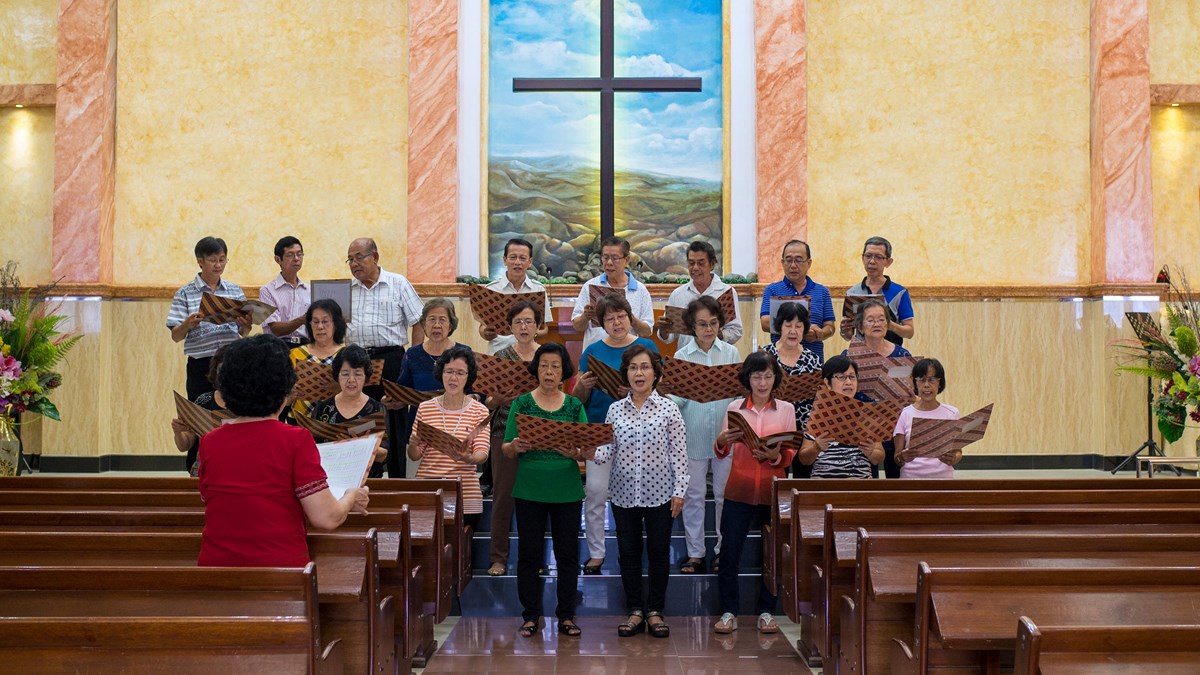
When Christians around the world today think of Indonesia, the first thing that may come to mind is “the country with the largest Muslim population in the world.” However, Indonesia is a culturally and religiously diverse country. Christians are an estimated 10 percent of Indonesia’s population of 210 million, putting Indonesia in the upper third of countries with the largest numbers of Christians.
Today, millions of the Chinese diaspora community live in Indonesia (estimated numbers range from more than 2 million to more than 7 million, depending on the statistical method). There are Chinese churches with different traditions and compositions throughout Indonesia.
Historically, Chinese in Indonesia were discriminated against and marginalized at various times. How did the Chinese church in Indonesia survive and develop in the difficult past? In today’s Indonesia, there are also some unique regulations on religious practices. What impact would that have on Chinese church growth? What evangelical challenges and opportunities do Chinese churches in Indonesia face serving the younger generation in today’s multicultural environment?
The following is part of a transcript of an interview of pastor Samuel Fu of Pontianak Congregation of West Kalimantan Christian Church by David Doong, general secretary of the Chinese Coordination Center for World Evangelism (CCCOWE) in February 2022.
Multiculturalism in the nation of a thousand islands
Doong: If you were to introduce Indonesia to people who didn’t know much about it, what would you say? What is the situation of the Chinese immigrants in Indonesia?
Fu: Indonesia is a country of a thousand islands, or nusantara in Indonesian. It is a country composed of more than 6,000 islands. There are more than 100 ethnic groups in Indonesia. Although Muslims are the majority, Indonesia is a very diverse country. Different places and different ethnic groups have distinctive languages. The unified language of our country is Indonesian, and almost all Indonesians can speak Indonesian, including the Chinese immigrants. Most Chinese today are in the second or third generation, so they are all educated in Indonesian.
The Indonesian government recognizes six religious beliefs: Islam, Catholicism, Christianity, Hinduism, Buddhism, and Confucianism. The state does not allow civilians to have no religious belonging. On the ID card, every civilian must choose one of the beliefs.
In 1965, a coup d’état happened. The government believed that there was a communist influence behind it and considered most of the Chinese to be communists. A lot of Chinese were arrested. Because of the discrimination, many Chinese chose Christianity as their religion on paper during that time. There were a lot of refugees, and the people came out from inland. It turned out to be a good opportunity to share the gospel. Many Chinese believed in Jesus due to political factors.
Christianity and Catholicism in Indonesia have grown rapidly in the past few years. On the one hand, many young people came to faith. On the other hand, Chinese churches in Indonesia are also actively participating in social services, such as running schools and hospitals. Through these community services, the church has opportunities to share the gospel. In recent years new media has also become a practical way to share the gospel. The church in Indonesia is in an ever-growing state.
Doong: The policy that everyone must choose a religion is interesting. If a person converts to Christianity, does he or she need to change the information on the ID card? Or are people not allowed to convert to another religion?
Fu: You will need to go through legal procedures to convert to another religion. If a Muslim converted to Christianity, he would face more pressure from society. He may get excluded, and even face threats and persecutions. However, under state law, a person is allowed to change his beliefs. If you convert from Confucianism and Buddhism to Christianity, it will be relatively simple, and the government will not interfere because it is a personal matter. As for the Chinese church, our main reach-out is to people of Buddhist and Confucian backgrounds. When they believe in Jesus and are baptized in the church, their ID cards will be changed from Buddhism or Confucianism to Christianity. There is no significant difficulty.
The situation of Chinese immigrants and the Chinese Church
Doong: As far as I know, there was a time when children were prohibited from learning Chinese in Indonesia. The second generation of Chinese who grew up in Indonesia, including many middle-aged and younger generations, are very unfamiliar with Chinese and mainly use Indonesian and English. Will these next generations prefer to attend multicultural churches or churches that speak Indonesian and English?
Fu: Chinese Indonesians tend to maintain relationships with other Chinese people while also integrating into society. We live in areas that are populated mostly by Chinese. In some provinces of Indonesia, the Chinese people are educated in Indonesian and stipulated to speak only Indonesian in public places. Yet they have kept speaking a Chinese dialect at home despite the gap with the Chinese language for more than 30 years in the society.
After Suharto stepped down as president in 1998, Indonesia began to open up to the Chinese language. Chinese in some areas have the opportunity to communicate and receive education in Chinese. There are three types of Chinese Indonesian churches: The first is Chinese Indonesian churches that speak Indonesian only while 70 percent or more of the people are ethnically Chinese, and there are many such churches now. The second type is the bilingual churches, in which the older people speak Chinese or their mother tongue dialect, and the younger ones speak Indonesian. My church belongs to this category. In general, this type of church would have Indonesian gatherings with translation and bilingual sermons. The third type is the Chinese-speaking Chinese churches. They worship and serve in Chinese only, but they are relatively rare.
Doong: I have come across many young Indonesians who also speak English. Is it because English is also a primary language besides Indonesian?
Fu: It is easier for people whose first language is Indonesian to learn English. We have been learning English since elementary school. However, the general English ability of Indonesians is rather basic. If they are Indonesians studying abroad, their English would be much better. For local Indonesians who learn English as a third language, their listening ability may be fine, but they would struggle with English speaking.
Doong: Fifty-seven years have passed since 1965. I am curious—how would you see the growth of Chinese churches in Indonesia? What are the good developments? What are some opportunities? Are there any bottlenecks and crises?
Fu: I think three characteristics mark the Chinese churches in Indonesia. First, Chinese churches in Indonesia are generally enthusiastic about sharing the gospel and have planted many inland churches. Second, they are diligent in studying the Bible and pursuing the truth. Third, they are devoted to prayer. These are the ways these churches practice discipleship. I believe as long as we keep up these good traditions, the Chinese churches in Indonesia will continue to prosper and grow healthily.
In addition, our country is relatively open now. With the fast economic growth of mainland China, the Chinese government has invested a lot in Indonesia, which indirectly caused the Indonesian government to see Chinese Indonesians in a better way. The people also realize the importance of the Chinese language, and their interest in learning Chinese has increased. This is particularly a good phenomenon for Chinese churches.
When Suharto came to power and banned the use of Chinese and Chinese-speaking schools, the Chinese church was the only group of people that kept the language amid the 30 years of Chinese-language gap. It is God’s grace and mercy that the Chinese language and culture was preserved through the church.
When the country opened up, the Chinese church was quick to adapt to the change. The second type of Chinese Indonesian church that I just mentioned had stopped worshiping in Chinese before, but now they use Chinese again. Many young people in the church go to China or Taiwan to learn the Chinese language and use Chinese to participate and serve in the church after returning. I am optimistic about the future of the Chinese Indonesian church.
Helping the younger generation
Doong: In terms of shepherding and cultivating young people, the global church is facing more challenges today. Do Chinese churches in Indonesia also encounter such challenges?
Fu: Honestly, yes. For example, some churches are more conservative and traditional in terms of worship, which leads to the loss of the younger generation. Some young people will go to churches that practice their preferred style of worship. Over the past few years, Chinese Indonesian churches have reviewed and reflected on how to react to the trend. Of course, we don’t want superficial improvements such as worship style. The essential question is how to keep these young people in the faith.
We believe that the younger generation seeks to be recognized in the church and wants to have a sense of belonging to the church. They hope they can grow and participate in it. But Chinese churches in Indonesia still tend to be more paternalistic. Deacons and pastors are usually older people. I think we need to listen to the opinions of young people more and give them more opportunities to participate in church service to keep them.
Doong: Conservative or not is relative. What we think to be the conservative style of worship was trendy 50 or 60 years ago. Sometimes I believe that God created us to be way more sophisticated and creative. On the one hand, we do not need to feel that there is one correct way to worship; on the other hand, we do not need to chase trends. Tradition has its beauty, and trendy style has its merit. The task of our generation is to be transformed by the renewal of our mind, to learn from the precious heritage of the 2,000 years of church history, to share the gospel and train disciples in today’s language.
Fu: I agree. What we care about is not the style of worship but the way to implement discipleship and let these young people find an environment where they would feel they are recognized and able to grow and learn. I believe this is our primary responsibility. Just like in my church, we are currently encouraging young people to start small groups. They are very committed, devoted, and active in their group.
A coworker recently did a survey in our church. When asked, “What do you expect the most from the church?” teenagers, young people, and adults in my church have all answered with “the Word of God.” Their expectation for the church is not better music or worship but solid biblical teaching. I believe that we must recognize and respond to the deepest concern of the congregation. What should be the center of our worship and shepherding? We must not rigidly adhere to styles or superficial needs.
Translation by Yiting Tsai
- Home delivery of CT magazine
- Complete access to articles on ChristianityToday.com
- Over 120 years of magazine archives plus full access to all of CT’s online archives
- Learn more


